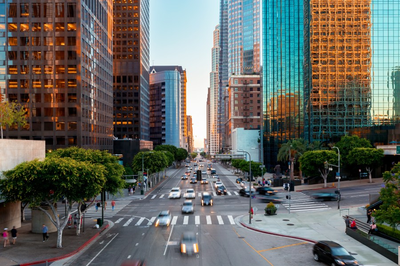
SAN DIEGO (KSWB) -- A bill that would establish a pilot program in six California cities to ticket speeding drivers with cameras instead of police is headed to Gov. Gavin Newsom's desk for approval.
AB 645 proposed the five-year pilot program to give local transportation departments in the cities of San Jose, Oakland, Los Angeles, Glendale, Long Beach and the city and county of San Francisco the ability to install automated speed safety systems.
These cameras would use a mobile radar to monitor for drivers going at least 11 miles over the posted speed limit, snapping a picture of their license plate to issue speeding tickets to the driver.
According to the bill, transportation departments can deploy anywhere from nine to 125 cameras throughout their jurisdiction depending on population size, prioritizing areas such as school zones, high-injury roadways and known street racing corridors in geographically diverse locations.
Drivers that are found to be speeding through these areas will be fined relative to how many miles per hour they went over the speed limit. The first infraction, however, would be a warning.
Under AB 645, the penalties would be:
- $50 for driving 11 to 15 miles per hour above the speed limit.
- $100 for driving 16 to 25 miles per hour over the speed limit.
- $200 for driving 26 miles per hour or more over the speed limit.
- $500 for driving at a speed of 100 miles per hour or more.
All violations would be written, according to the bill, and will issued to the registered owner.
Unlike some cities' red light camera programs, these violations would not be considered criminal -- they would be civil -- and would not result in points on your license, Assemblymember Laura Friedman (D-Burbank), who co-authored the bill, explained in a statement to FOX5SanDiego.com.
In lieu of payment, cities and counties can also offer those who receive a ticket the alternative to perform community service to satisfy their violation. People who meet certain income or housing criteria can also receive deductions of these fines anywhere from 50 to 80%, the bill stipulates.
"Speed cameras are about slowing drivers down and saving lives, not about punishment," Friedman continued.
"Research has shown speed cameras can reduce crashes by 54% in urban cores, especially high-injury and fatality crashes," she added. "That’s why seven other states with Democratic and Republican governors have authorized have authorized or expanded the use of speed cameras this year."
According to data from the National Transportation Safety Board, areas that implemented automated speed enforcement saw a decrease in the number of crashes that occurred -- anywhere from 8 to 49% for all collisions and 11 to 44% for those that resulted in serious or fatal injuries.
In cities like Los Angeles, speed is the No. 1 factor in crash severity.
" … every year for the past five years, more than 1,000 Californians have died in speed-related traffic collisions," Los Angeles officials wrote in support of AB 645. "These deaths and injuries are preventable. Jurisdictions suffering from high levels of avoidable fatal and severe collisions are desperate for additional tools to bring the number of traffic deaths down to zero."
New York City, which deployed 750 speed cameras back in 2020 during certain time periods, saw speeding decrease by about 73% as of December 2021, according to a report from the city's Department of Transportation.
New York City officials expanded implementation of the program to allow 24/7 automated enforcement of speeding this year, according to reports -- a move that contributed to a 30% drop in violations over the last 12 months.
AB 645 was passed through the legislature last Wednesday, receiving bipartisan support. Opponents of the bill cited concerns about how the speeding cameras could contribute to increased surveillance.
"There are effective alternatives to reduce speed-based traffic collisions without these harmful
impacts, including those highlighted in the bill itself: roundabouts, speed humps or speed tables, traffic circles, and other traffic-calming measures that do not require increasing surveillance to automate enforcement and issue more tickets," the National Motorist Association wrote in a report.
Newsom has until Oct. 14 to either sign or veto the bill. If signed into law, California's pilot program under the AB 645 will last five years.
For the six participating areas, the bill requires transportation agencies to issue warnings rather than notices of violation to drivers for the first 60 days of the program, coinciding with a month-long public information campaign to help educate residents about the new cameras.
After the program expires, state and local officials will assess the success of the program to explore expanding it across California.